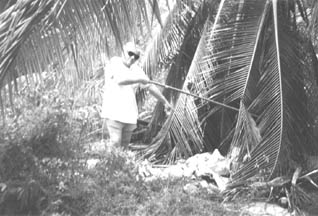by Carolyn Hauser Corbet
Dave and I were a pair of knowledgeable novices when we headed offshore
for the first time, in December 1991. We knew what trash was, the maritime regulations
governing the disposal of waste products at sea, and that we had no desire to start a
garbage collection aboard ship. That about covers the knowledgeable part.
As novices, we didn't know when or where we'd have and opportunity to
rid ourselves of garbage upon our arrival in the scarcely populated islands of the
northern Acabos. Nor did we have a clue as to what facilities the Bahamians had for
handling boat garbage, or what cost we might incur. So it was, in perfect compliance with
the law, that Godspede's meager accumulation of rubbish was strewn thirty-odd mile
off the coast of Ft. Lauderdale, Florida.
That was over five years ago and I still feel guilty about it.My
conscience is not soothed by recalling how little we actually jettisoned and that only
paper products were discarded overboard. Dave, being a realistic chap, mentions the
condition of the seas that blustery winter night. He considers the likelihood that our
paper towels washed up intact on some pristine east coast beach to be extremely remote.
Nevertheless, idyllic section of shoreline throughout the world have
been desecrated by thoughtless or inconsiderate people.There are simple solution for
dealing with this trashy problem.
The most convenient procedure for ridding your boat of accumulated
trash is to deftly deposit it in the nearest dumpster! We do this whenever the opportunity
presents itself, always requesting permission in advance.
 When out day sailing or on a weekend
excursion, the dumpster plan works out fine. However, when time permits spending a week, a
month, or longer out cruising, trash disposal can become problematic. The further one
strays from "civilization," the larger the problem of refuse can turn out to be
When out day sailing or on a weekend
excursion, the dumpster plan works out fine. However, when time permits spending a week, a
month, or longer out cruising, trash disposal can become problematic. The further one
strays from "civilization," the larger the problem of refuse can turn out to be
Dave and I have never been comfortable in the company of sailors whose
first chore upon dropping the hook in a secluded, pristine anchorage is to find the local
"dump." The "dump" is merely an easily accessible spot that previous
cruisers have designated as a makeshift rubbish heap. Spectacular, untainted beaches from
a distance -- an abomination to the senses upon closer examination. The ground beneath
magnificent palms or towering cliffs is littered with beer cans, styrofoam plates, and a
proliferation of other rubble. Witless conduct of fellow cruisers can mar the splendor of
storybook anchorages for all who follow in their wake.
Does it have to be like this? Is it noticeably more expensive, time
consuming, or bothersome to deal with refuse in a ecologically sound way? No.
Start by elimination potential garbage as it comes aboard.Transfer
provisions to plastic containers. The cereal, having found a new home in Tupperware, will
stay fresh longer and the original box gets the old heave-ho. Ditto for apple juice, mild,
flour, potato flakes, and corn meal. Prepare your first meal and store is till evening.
This gives you a chance to relax with a sundowner later, and allows the immediate
advantage of being able to ditch a few more cans or packages before casting off.
Great, you say. I did all that. Now I'm days out from the nearest
marina, it's 85 degrees in the shade, and not only is my garbage can overflowing, it
stinks!
Welcome to the world of garbage. Frankly, there are two serious
disadvantages to collecting garbage -- space limitations and aroma. Inhaling the olfactory
assault of day old (or week old!) coffee grounds, onion skins, and potato peelings can
have one frantically thumbing throughBOAT/US catalogs in search of DC powered garbage
disposals. Confider three alternatives before placing you order:
1) Utilize other garbage as receptacles of offensive leavings. Mayo
jars, cottage cheese cartons, and pickle bottles can be filled with scraps. Double bag
these along with other refuse and tow along behind in your dinghy.
2) Wet garbage can be buried. (Note: Some cruisers bury all
their garbage.While I have a difficult time sanctioning this practice, it certainly is
preferable to scattering it along the coastline. At least these people are trying.)
3) Wet garbage can go over the side if you are miles from a populated
area. Do away with food scraps in deep water while underway. The sea life will be
delighted to dine on your leftovers. This method is not wise in anchorages where one plans
to swim.
A logical rule of thumb is that if you're in a location where casting
egg shells overboard will be offensive to those ashore, you're most likely in a place
where garbage disposal facilities are available.
For the moment, though, picture miles of people-free water between you
and the nearest habitation. You've got the odoriferous wet garbage dilemma under control.
Life is grand! Or it would be but for the sheer quantity of dry refuse. It's growing with
such rapidity that you anticipate sharing your berth with empty tomato juice cans. Again,
there are a variety of solutions.
During our first year of cruising, I became a champion Coke bottle
stuffer. I'd cut the tops off 2-liter bottles, stuffing them full of other dry rubbish.
Paper towels were squished into bitsy cans, small cans jammed into larger ones, and large
cans shoved into plastic soft drink bottles. Granted, it was never the highlight of my
day, but I'm not the crew member who cleans the fish or the bilge, so things even out in
the long run.
Coke bottle stuffing, however, has become ancient history for the
Corbetts. We now deal with garbage disposal aboard Bifrost, our new-to-us boat, in
the same manner we use at the cabin during summer months.While ashore, wet garbage goes to
the compost pit, burnable garbage is burned, and recyclables are recycled. Miscellaneous
trash (approximately one bag every six weeks) is spirited away by the garbage man.
The key we had overlooked when we took to the water fire. Burning
eliminates magazines, toilet paper, candy wrappers, snack boxes, and all manner of other
paper products. Right, you say. An excellent plan! Just where aboard my yacht do you
suggest I stoke the flames?
Obviously, you don't. Take burnables ashore in a paper or plastic bag.
I have torched trash on some of the most exquisite stretches of sandy beaches this side of
heaven. Do I feel guilty? Not on your life! Bifrost's garbage isn't resting on the
bottom of the ocean, nor is it scattered along the coast line. It's gone, leaving no more
of a scar on the shore than does a campfire built to grill freshly caught fish.
My personal preference is to burn frequently rather than having a
larger fire less often. Simply dinghy ashore with garbage bag, charcoal starter fluid, and
lighter in hand. (Anticipate outraged glares from cruisers with whom you're sharing an
anchorage. Hostility will turn to respect once they recognize your intentions.) Choose a
spot ear the water, gauge the wind, and line a pit with rocks. Adieu, debris!
Is this troublesome or overly time consuming? Nope. i exercise on the
beach while waiting for the flames to die down.It's highly superior to doing push-ups on
the rolling deck of a sailboat! The sparks and my energy generally burn out about the same
time. Sifting through the cinders with a stick,I remove bits of foil and whatnot that
didn't go up in smoke.With a bit of sand kicked over the ashes, only my footprints show
I've been there.
Keep in mind, of course, that I'm not endorsing building a bonfire in
someone's front yard in Hilton Head!
Wet garbage - gone. Burnables - gone.That leaves recyclables and
miscellaneous trash, such as light bulbs, aluminum foil, and the like. Wash cans, jars,
and bottles out with salt water. Remove ends from cans, if possible, and crush. Give the
trash a home in the bilge until you return to the land of the dumpster.
Ideally, the dumpster will be located right next to recycling
containers. Coastal cities should be encouraged to sponsor active recycling programs among
the cruising community. Most sailors would be eager to anticipate. All we ask is
availability of the necessary receptacles within reasonable walking distance from marinas.
After all, we "boat people" are living pretty closely with good ol' Mother
Nature. We want to do the best we can to safeguard her well being. •
Carolyn Corbett is a frequent contributor who has also appeared in Cruising World,
Latitudes & Attitudes, Nor'westing, MN Sportsman, Coastal Cruising, Sailing Magazine
and a variety of smaller publications.
 When out day sailing or on a weekend
excursion, the dumpster plan works out fine. However, when time permits spending a week, a
month, or longer out cruising, trash disposal can become problematic. The further one
strays from "civilization," the larger the problem of refuse can turn out to be
When out day sailing or on a weekend
excursion, the dumpster plan works out fine. However, when time permits spending a week, a
month, or longer out cruising, trash disposal can become problematic. The further one
strays from "civilization," the larger the problem of refuse can turn out to be (a trashy tale...)
(a trashy tale...)